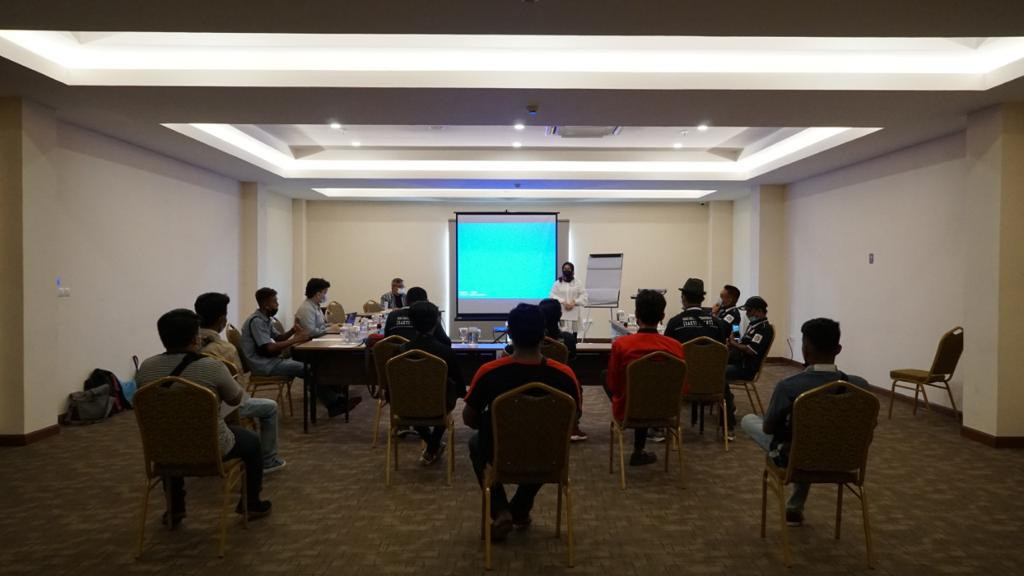Popular Reads
Top Results
Can't find what you're looking for?
View all search resultsPopular Reads
Top Results
Can't find what you're looking for?
View all search resultsGovt. ratifies regulation on Indonesian migrant fisheries, seafaring workers
Change text size
Gift Premium Articles
to Anyone
T
he government ratified on Wednesday Government Regulation (PP) No. 22/2022 on the placement and protection of migrant trading and fishing vessel crew.
The newly minted regulation is in accordance with Article 64 of Law No. 18/2017 concerning the protection of Indonesian migrant workers.
In a statement, the Indonesian Ocean Justice Initiative (IOJI) welcomed the news, saying that the ratification of PP No. 22/2022 signified progress in efforts to protect Indonesian migrant fishery workers, even though the promulgation of the regulation must be carried out no later than two years after the enactment of Law No. 18/2017 on Nov. 21, 2019.
There is a difference in terminology between PP No. 22/2022 and Law No. 18/2017, where the former uses the term “migrant fishing boat crew”, while the former uses the term “Indonesian fishery seafaring migrant workers” (PMI PP).
According to the IOJI, Indonesian migrant workers who are employed or working on foreign-flagged fishing vessels should be referred to as PMI PP.
Article 25 of PP No. 22/2022 reaffirms that companies employing PMI PP are required to have a permit from the Manpower Ministry, namely the Indonesian migrant worker placement company permit (SIP3MI). Meanwhile, the Transportation Ministry also has the authority to issue placement company permits in the form of a crew recruitment and placement business license.
“The regulation regarding the sole authority for issuing permits is expected to be a solution to overlapping licensing authority and supervising the placement of PMI PP between the Transportation Ministry and the Manpower Ministry,” it said.
The IOJI also found that PP No. 22/2022 still leaves a number of issues unresolved — especially those related to the fate of PMI PP placed by manning agencies after July 7, 2021 — until the issuance of PP No. 22/2022. This is due to the revocation of Transportation Ministerial Regulation No. 84/2013 by Transportation Ministerial Regulation No. 59/2021.
Meanwhile, PP No. 22/2022 also sets the minimum standards for sea work agreements (PKL), which include working hours and breaks according to International Labor Organization (ILO) Convention 188 (C188) and the obligation to have a collective bargaining agreement (CBA), which can protect and strengthen PMI PP's bargaining position.
The IOJI noted that PKL and CBA standards needed to be further regulated by the Agency for the Protection of Indonesian Migrant Workers (BP2MI) for the former and by the Manpower Ministry for the latter so as to ensure a balanced relationship between PMI PP and their employers.
Although Article 35 (2) and (5) of PP No. 22/2022 guarantees the forms of protection employers must provide for PMI PP, it added, the government needed to negotiate and cooperate bilaterally with the countries of placement to determine PMI PP protection standards in accordance with applicable international standards.
Before drafting a memorandum of understanding (MoU) with the countries of placement, however, the IOJI advised the government to immediately ratify international conventions, especially ILO C188, to further strengthen Indonesia's bargaining position in negotiations.
In order to expedite the process of drafting an MoU related to mutual recognition commitments for PMI PP training certificates, the Maritime Affairs and Fisheries Ministry needs to accelerate the process of formulating a training curriculum according to the International Convention Standards of Training, Certification and Watchkeeping for Fishing Vessel Personnel (STCW-F) to ensure the competency certificates held by PMI PP are recognized internationally.
Another issue the IOJI found was the unintegrated data between ministries and institutions, noting that this was one of the root causes of the weak protection of PMI PP.
“PP No. 22/2022 answers this problem by requiring data integration between relevant government agencies. Integrated data will be very useful for all relevant government agencies in carrying out PMI PP protection, including handling public complaints. However, PP No. 22/2022 does not regulate the mechanism for managing public complaints and resolving disputes,” it said.
To conclude, the IOJI highlighted vital issues that needed to be considered in an effective complaint management and dispute resolution mechanism, including the availability of an easily accessible complaint system administered by the government.
At the same time, the complaint system must be equipped with a witness and whistleblower protection system, including identity confidentiality. Officers handling public complaints must also have the skills to explore and understand the problems faced by the complainants and their follow-up, as well as close cooperation and coordination between government institutions in handling and resolving public complaints.










